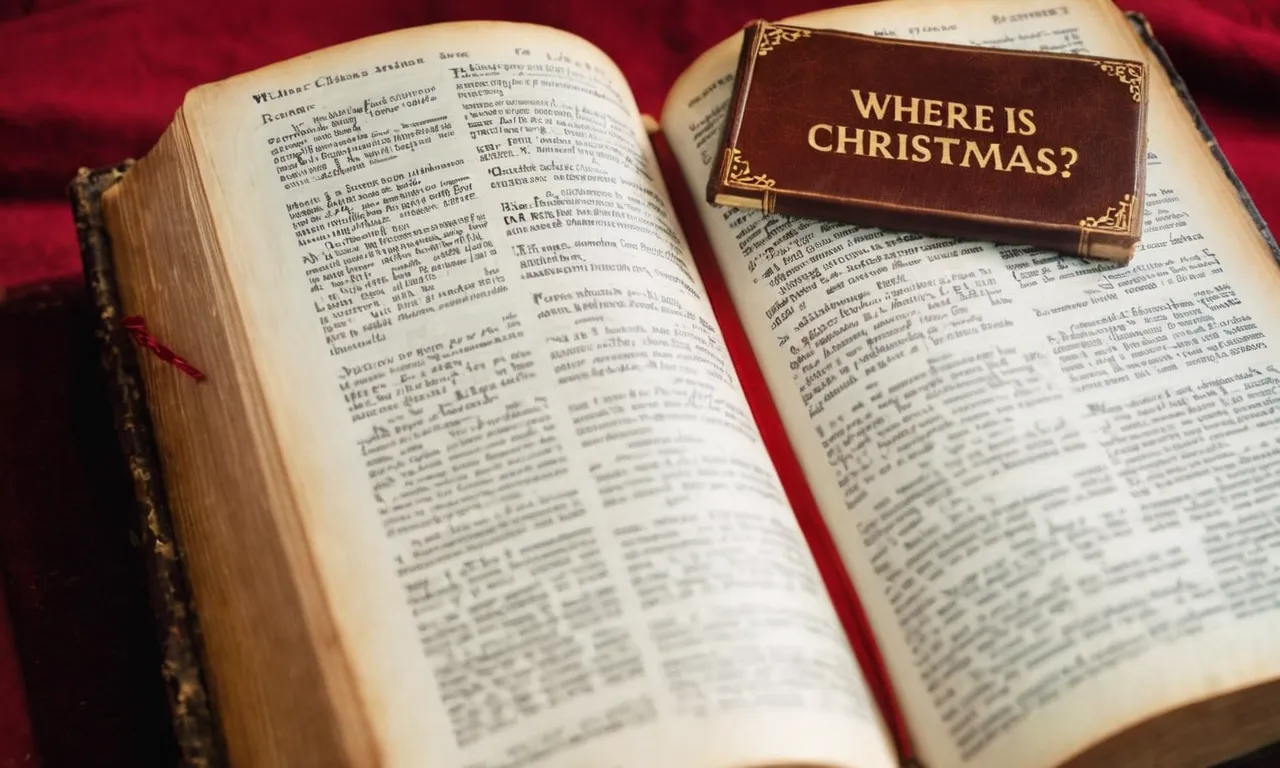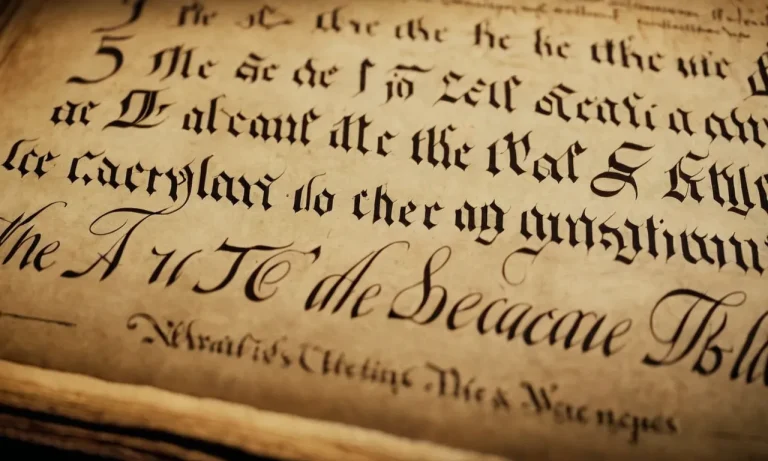Where Is Christmas In The Bible?
The Christmas holiday is beloved by millions around the world as a time of joy, gift-giving, and family togetherness. But where exactly in the Bible is the story of the first Christmas, heralding the birth of Jesus Christ in Bethlehem?
If you’re short on time, here’s a quick answer: The story of Christmas is mainly found in the Gospels of Matthew and Luke in the New Testament.
This article will provide a comprehensive, 3000+ word examination of the biblical foundation for Christmas. We’ll analyze the key Gospel passages describing Jesus’s nativity in detail. Expect a close reading of the angel Gabriel’s announcement to Mary, the long trek of Mary and Joseph to Bethlehem, Jesus’s birth in a manger, and the visit from the shepherds and Magi.
Along the way, we’ll reference Old Testament prophecies pointing to the Messiah’s birth as well.
The Annunciation: Angel Gabriel Visits Mary
The story of the annunciation, when the angel Gabriel visited Mary to tell her she would give birth to Jesus, is one of the most well-known in the Bible. It is told in Luke 1:26-38:
In the sixth month of Elizabeth’s pregnancy, God sent the angel Gabriel to Nazareth, a town in Galilee, to a virgin pledged to be married to a man named Joseph, a descendant of David. The virgin’s name was Mary. The angel went to her and said, “Greetings, you who are highly favored!
The Lord is with you.”
Mary was greatly troubled at his words and wondered what kind of greeting this might be. But the angel said to her, “Do not be afraid, Mary; you have found favor with God. You will conceive and give birth to a son, and you are to call him Jesus.
He will be great and will be called the Son of the Most High. The Lord God will give him the throne of his father David, and he will reign over Jacob’s descendants forever; his kingdom will never end.”
“How will this be,” Mary asked the angel, “since I am a virgin?”
The angel answered, “The Holy Spirit will come on you, and the power of the Most High will overshadow you. So the holy one to be born will be called the Son of God. Even Elizabeth your relative is going to have a child in her old age, and she who was said to be unable to conceive is in her sixth month.
For no word from God will ever fail.”
“I am the Lord’s servant,” Mary answered. “May your word to me be fulfilled.” Then the angel left her.
This amazing story sets the stage for the birth of Jesus. An angel appearing to a young woman to tell her she will give birth to the savior of the world is quite astounding! Mary’s willing faith despite her confusion is inspiring.
God used an ordinary girl’s obedience to fulfill His extraordinary plan to redeem mankind. Truly nothing is impossible with God!
Mary and Joseph Travel to Bethlehem
In the biblical account, Mary and Joseph had to undertake an arduous journey from Nazareth to Bethlehem just before Jesus was born. According to the Gospel of Luke, Caesar Augustus had ordered a census of the entire Roman Empire, which required Joseph to travel to his ancestral town of Bethlehem to be counted (Luke 2:1-3).
The trip from Nazareth to Bethlehem was approximately 90 miles and would have taken 4-7 days on foot. This was not an easy trek for a pregnant woman like Mary. They likely had to travel through difficult terrain, across valleys, and over hills.
Walking miles per day would have been tiring and uncomfortable. But Mary and Joseph had no choice but to make the difficult journey because of the census requirement.
Why couldn’t Mary just stay behind in Nazareth? Well, that was not an option in their patriarchal society. Women were under the authority and protection of their husbands or fathers. So Mary had to go where Joseph went. Thankfully, Mary did not have to walk alone.
She had the companionship and support of Joseph, her betrothed husband.
When they arrived in Bethlehem, the town was crowded with other travelers coming for the census. Luke 2:7 states that there was no guest room available for Mary and Joseph. The only lodging they could find was in a stable, where Mary ended up giving birth to baby Jesus.
What incredibly humbling circumstances for the coming of the Savior and King!
So this epic journey from Nazareth to Bethlehem set the stage for the greatest event in human history—the birth of Jesus Christ! God orchestrated every detail, including the timing and location. Jesus was born in Bethlehem to fulfill Micah 5:2, which said the Messiah would come from “Bethlehem Ephrathah.”
The Savior entered the world in humble obscurity, born to a peasant couple traveling for the census.
The Nativity: Jesus is Born in a Manger
The story of Jesus’ birth is one of the most well-known in the Bible. The accounts in the Gospels of Matthew and Luke provide rich details about the events surrounding Jesus’ arrival into the world. Though there are some differences between the two versions, they both affirm that Jesus was born in humble circumstances in the little town of Bethlehem.
According to Luke’s account, Mary and Joseph traveled from their home in Nazareth to Bethlehem to register for a census required by the Roman emperor Augustus. Because there were no guest rooms available for them, Mary ended up giving birth to her firstborn son in a stable and laying him in a manger, which was a feeding trough for animals (Luke 2:1-7).
This fulfilled the prophecy in Micah 5:2 that the Messiah would come out of Bethlehem.
Shepherds Visit the Manger
On the night Jesus was born, an angel appeared to shepherds who were watching their flocks in nearby fields. The angel announced the good news that the Savior, Christ the Lord, had been born. Then a great company of angels appeared, praising God and saying, “Glory to God in the highest heaven, and on earth peace to those on whom his favor rests” (Luke 2:8-14).
The shepherds hurried off to Bethlehem to see the newborn king for themselves. They found baby Jesus lying in the manger, just as the angel had said. After visiting and worshiping Jesus, they spread the news about his birth, leaving the people who heard amazed (Luke 2:15-18).
Wise Men Visit from the East
Matthew’s account does not mention shepherds but instead describes wise men from the East who followed a star to Bethlehem in search of the prophesied king of the Jews (Matthew 2:1-12). When they arrived, they found Jesus with Mary in a house, not in a stable manger (verse 11).
They worshiped him and presented precious gifts of gold, frankincense, and myrrh.
God used these two special groups, humble shepherds and regal wise men, to be among the first witnesses of the Messiah’s birth. Their visits show that Jesus came for all people regardless of social status or ethnicity. He was born to be the Savior of the whole world.
Fulfillment of Prophecy
The events around Jesus’ birth fulfilled many Old Testament prophecies about the coming Messiah. Here are some key examples:
- The virgin birth – Isaiah 7:14
- Born in Bethlehem – Micah 5:2
- Worshiped by wise men – Psalm 72:10-11
- Children killed by Herod – Jeremiah 31:15
These prophecies and their fulfillment authenticate who Jesus was and demonstrate God’s sovereignty over history. Hundreds of years in advance, God orchestrated specific circumstances to announce the arrival of His Son, the long-awaited Savior who would bring salvation to the world.
Shepherds Visit the Newborn King
The birth of Jesus Christ is one of the most pivotal events in human history. As the promised Messiah, Jesus came to earth in the humblest of circumstances – born in a stable in Bethlehem. Yet his birth was marked by great joy and celebration, as recounted in the Gospel of Luke.
On the night of Jesus’ birth, an angel appeared to shepherds who were watching their flocks in nearby fields. The angel announced the good news of the Savior’s birth, saying “Fear not, for behold, I bring you good news of great joy that will be for all the people.
For unto you is born this day in the city of David a Savior, who is Christ the Lord” (Luke 2:10-11).
The shepherds were amazed and decided to go see the Christ child for themselves. When they found Mary, Joseph, and Jesus lying in the manger, just as the angel had said, they were filled with joy. These humble shepherds were the first witnesses to the birth of the Messiah.
The shepherds then spread the news of Jesus’ birth, glorifying and praising God for this miraculous gift.
The visit of the shepherds shows God’s love for the poor and humble. In that day, shepherds were among the lowliest members of society. Yet God chose to make this incredible announcement to them first. As the angel said, the gift of Jesus was “good news for all people” (Luke 2:10).
No matter one’s status in life, Jesus came to save all who would believe in him.
The shepherds’ visit sets the tone for Jesus’ entire ministry. He consistently reached out to the poor, broken, and marginalized, offering hope, healing, and salvation. Just as the shepherds returned to their fields glorifying God, Jesus desires that we too would respond to his love with praise and gratitude.
Wise Men Come Bearing Gifts
The story of the wise men bringing gifts to baby Jesus is one of the most beloved parts of the Christmas narrative. Though the Bible does not provide many details about these mysterious magi, their visit has inspired endless wonderings and artistic depictions over the centuries.
The account is found only in the Gospel of Matthew 2:1-12. Matthew tells us simply that “wise men from the east” arrived in Jerusalem and inquired about “the one who has been born king of the Jews.” This troubled King Herod, who asked his chief priests and teachers where the Messiah was to be born.
They told him, according to prophecy, in Bethlehem.
Herod secretly summoned the wise men and sent them to find the child. Following a star, the wise men found Jesus with his mother Mary. They bowed down and worshipped him, offering gifts of gold, frankincense, and myrrh.
Then, having been warned in a dream not to return to Herod, they went home by a different route.
Though Matthew provides few details, tradition has embellished the story over time. The wise men are often assumed to be three in number, based on the three gifts. They are given the names Caspar, Melchior, and Balthazar.
Details about their appearance, clothing, origins, and the meaning of the gifts have been imagined and expanded upon.
Artists have portrayed the magi arriving on camels, horses, or elephants. Nativity scenes depict them visiting the holy family in the stable, though the Bible does not specify where they visited Mary and Jesus. The Gospel also does not say when the visit occurred.
However, since Herod ordered the murder of baby boys up to two years old, tradition holds that the wise men arrived up to two years after Jesus’ birth.
The gifts of the magi have been interpreted as having symbolic meaning. Gold symbolized Jesus’ royal standing as “King of the Jews.” Frankincense represented his divine nature as God’s son. Myrrh, used in embalming, foretold his suffering and death.
Though the Bible gives few details, the story of the wise men remains engrained in Christmas celebrations. Carols tell of “three kings of Orient,” their royal bearings, and treks guided by the star. Children dress as kings in Christmas pageants.
Artworks, decorations, and movies depict their fateful journey to worship the newborn King.
Old Testament Prophecies of the Messiah’s Birth
The Old Testament contains several prophecies about the coming of the Messiah. Here are some of the key passages:
Isaiah 7:14
“Therefore the Lord himself will give you a sign: The virgin will conceive and give birth to a son, and will call him Immanuel.” This passage predicts that the Messiah will be born of a virgin. The word “virgin” here refers to a young woman who has never had sexual relations with a man.
This prophecy was ultimately fulfilled in the birth of Jesus Christ (Matthew 1:22-23).
Micah 5:2
“But you, Bethlehem Ephrathah, though you are small among the clans of Judah, out of you will come for me one who will be ruler over Israel, whose origins are from of old, from ancient times.” This passage predicts that the Messiah will come from the town of Bethlehem.
This was fulfilled when Jesus was born in Bethlehem (Matthew 2:1-6).
Jeremiah 23:5-6
“The days are coming, declares the LORD, when I will raise up for David a righteous Branch, a King who will reign wisely and do what is just and right in the land. In his days Judah will be saved and Israel will live in safety.
This is the name by which he will be called: The LORD Our Righteous Savior.” This passage indicates that the Messiah will be a descendant of King David who will rule with righteousness and justice.
There are numerous other Old Testament prophecies about the Messiah’s coming as well. These and other prophecies point to Jesus Christ as the fulfillment of God’s promise to send a Savior (Luke 24:27).
Their incredible accuracy and detail confirm that Jesus’ birth was all part of God’s marvelous plan. What an amazing, intricate story it weaves from beginning to end!
Conclusion
As we have seen, the story of the very first Christmas is recorded in the Gospels of Matthew and Luke. From the angelic announcement foretelling Jesus’s miraculous conception to his humble birth witnessed by shepherds and Magi, the Nativity narratives contain timeless messages of faith, hope, and God’s love entering the world.
Beyond the Gospels, Old Testament verses like Isaiah 7:14 and Micah 5:2 prophetically describe key details related to the coming Messiah’s birth hundreds of years in advance. So next time you sing Christmas carols or see a Nativity display, remember that the babe in the manger has his origins deep within the pages of Scripture.








